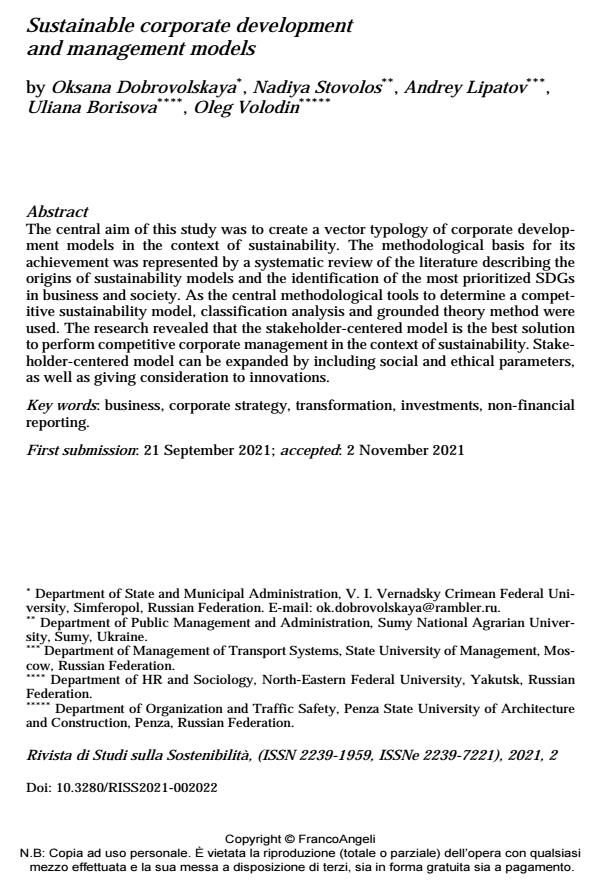Sustainable corporate development and management models
Titolo Rivista RIVISTA DI STUDI SULLA SOSTENIBILITA'
Autori/Curatori Oksana Dobrovolskaya, Nadiya Stovolos, Andrey Lipatov, Uliana Borisova, Oleg Volodin
Anno di pubblicazione 2022 Fascicolo 2021/2 Lingua Inglese
Numero pagine 17 P. 333-349 Dimensione file 211 KB
DOI 10.3280/RISS2021-002022
Il DOI è il codice a barre della proprietà intellettuale: per saperne di più
clicca qui
Qui sotto puoi vedere in anteprima la prima pagina di questo articolo.
Se questo articolo ti interessa, lo puoi acquistare (e scaricare in formato pdf) seguendo le facili indicazioni per acquistare il download credit. Acquista Download Credits per scaricare questo Articolo in formato PDF

FrancoAngeli è membro della Publishers International Linking Association, Inc (PILA)associazione indipendente e non profit per facilitare (attraverso i servizi tecnologici implementati da CrossRef.org) l’accesso degli studiosi ai contenuti digitali nelle pubblicazioni professionali e scientifiche
The central aim of this study was to create a vector typology of corporate development models in the context of sustainability. The methodological basis for its achievement was represented by a systematic review of the literature describing the origins of sustainability models and the identification of the most prioritized SDGs in business and society. As the central methodological tools to determine a competitive sustainability model, classification analysis and grounded theory method were used. The research revealed that the stakeholder-centered model is the best solution to perform competitive corporate management in the context of sustainability. Stakeholder-centered model can be expanded by including social and ethical parameters, as well as giving consideration to innovations.
Keywords:business, corporate strategy, transformation, investments, non-financial reporting.
- Abdimomynova A., Duzelbayeva G., Berikbolova U., Kim V. and Baimakhanova A. (2021). Entrepreneurship Education Prospects in The Public-Private Partnership System. Montenegrin Journal of Economics, 17(2): 83-92.
- Argüden Y. (2020). Responsible Boards – Action Plan for a Sustainable Future. -- Available at: https://openknowledge.worldbank.org/handle/10986/21700. Accessed 12 March 2021.
- Business Roundtable (2019). Business Roundtable Redefines the Purpose of a Corporation to Promote ‘An Economy That Serves All Americans’. -- Available at: https://www.businessroundtable.org/business-roundtable-redefines-the-purpose-of-a-corporation-to-promote-an-economy-that-serves-all-americans. Accessed 12 March 2021.
- Corporate Knights (2020). World’s 100 Most Sustainable Corporations Deliver Better for Investors. -- Available at: https://www.corporateknights.com/reports/2020-global-100/2020-global-100-ranking-15795648/. Accessed 12 March 2021.
- Harvard Business Review (2020). Making Sustainability Count. -- Available at: https://hbr.org/2020/08/making-sustainability-count. Accessed 12 March 2021.
- Jiang Q., Liu Z., Liu W., Li T., Cong W., Zhang H. and Shi J. (2018). A principal component analysis based three-dimensional sustainability assessment model to evaluate corporate sustainable performance. Journal of Cleaner Production, 187: 625-637.
- Karimi J. and Walter Z. (2016). Corporate entrepreneurship, disruptive business model innovation adoption, and its performance: The case of the newspaper industry. Long Range Planning, 49(3): 342-360.
- Ketprapakorn N. (2019). Toward an Asian corporate sustainability model: An integrative review. Journal of Cleaner Production, 239: 117995.
- Korolevska H. and Sendulskyi A. (2020). Trends of Corporate Innovations in 2020. -- Available at: https://massmediagroup.pro/blog-mmg/trends-of-corporate-innovations. Accessed 12 March 2021.
- Lozano R. (2015). A holistic perspective on corporate sustainability drivers. Corporate Social Responsibility and Environmental Management, 22(1): 32-44.
- Moellers T., von der Burg L., Bansemir B., Pretzl M. and Gassmann O. (2019). System dynamics for corporate business model innovation. Electronic Markets, 29(3): 387-406.
- OECD (2019). OECD Corporate Governance Factbook 2019. -- Available at: www.oecd.org/corporate/corporate-governance-factbook.htm. Accessed 12 March 2021.
- Oertwig N., Galeitzke M., Schmieg H.G., Kohl H., Jochem R., Orth R. and Knothe T. (2017). Integration of sustainability into the corporate strategy. In: Sustainable manufacturing. Cham: Springer, pp. 175-200.
- Petrenko L. (2020). ESG-criteria in the investment decision-making practice. International research journal, 11(101): 100-102.
- Rendtorff J. D. (2018). The Danish model of corporate citizenship: The Novo group. In: Progressive Business Models. Cham: Palgrave Macmillan, pp. 221-240.
- Schaltegger S., Hansen E.G. and Lüdeke-Freund F. (2016). Business models for sustainability: Origins, present research, and future avenues. Organization and Environment, 29(1): 3-10.
- Scott L. and McGill A. (2018). SDG Reporting Challenge 2018. PwC. -- Available at: https://www.pwc.ru/ru/publications/pwc-sdg-reporting-challenge-2018%20 web.pdf. Accessed 12 March 2021.
- Scott L. and McGill A. (2019). SDG Reporting Challenge 2019. PwC. -- Available at: https://www.pwc.com/gx/en/sustainability/SDG/sdg-2019.pdf. Accessed 12 March 2021.
- Scott M. (2020). The Global 100 difference. The voice for clean capitalism. Corporate Rights. -- Available at: https://www.corporateknights.com/reports/2020-global-100/global-100-difference-2-15795649/. Accessed 12 March 2021.
- Soler J. (2020). Moving sustainability from awareness to action and beyond. -- Available at: https://www.bbva.com/en/the-importance-of-esg-in-2020/. Accessed 12 March 2021.
- The Russian Union of Industrialists and Entrepreneurs (2021). National register of corporate non-financial reports. -- Available at: https://en.rspp.ru/. Accessed 12 March 2021.
- United Nations (2020). Take action for the Sustainable Development Goals. -- Available at: https://www.un.org/sustainabledevelopment/sustainable-development-goals/. Accessed 12 March 2021.
- Urbaniec M. and Żur A. (2020). Business model innovation in corporate entrepreneurship: exploratory insights from corporate accelerators. International Entrepreneurship and Management Journal, 1: 1-24. Accessed 12 March 2021.
- Voronov A. (2019). Antiviral resistance. Moscow: RBK.
- Wright Т. (2019). Strategic frameworks: 5 of the best and how to choose one. Cascade. -- Available at: https://www.cascade.app/blog/best-strategy-frameworks. Accessed 12 March 2021.
- Yakobashvili D. and Feoktistova E. (2019). Non-financial reporting in Russia and the world: sustainable development goals in focus. In: Analytical review for 2017-2018. Moscow: RUIE.
Oksana Dobrovolskaya, Nadiya Stovolos, Andrey Lipatov, Uliana Borisova, Oleg Volodin, Sustainable corporate development and management models in "RIVISTA DI STUDI SULLA SOSTENIBILITA'" 2/2021, pp 333-349, DOI: 10.3280/RISS2021-002022